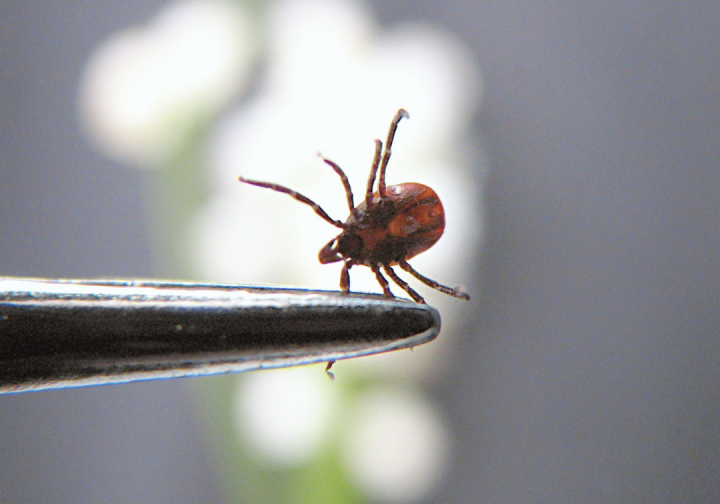
Tick-Borne Encephalitis prevention is due now
Winter is slowly coming to its end and spring is waiting behind the door! We cannot wait for more sunny days! However, sunny days are also bringing us all outdoor, spending more time in the parks, woods and early BBQs so it is good to bring awareness to ticks and tick-bites that can cause Tick-Borne Encephalitis.
What is Tick-Borne Encephalitis disease?
Tick-Borne encephalitis (TBE) is an infectious viral disease transferred by ticks and affecting the human nervous system. It is manifested through symptoms such as headache, fatigue, fever, nausea, pain in the joints, lower sensitivity in limbs, or sleeping disorders. TBE is a dangerous disease as approximately 25% of infected individuals suffer from permanent consequences of the disease, such as upper limb paralysis, chronic headache, disorders of concentration, mood, or sleep, however, deaths are very rare. The WHO recommends immunisation in regions where ticks appearance is common.
How can I get Tick-Borne Encephalitis disease?
TBE is transferred by a tick bite, but not every tick doesn't have to be infected. To be precise, it is actually not the tick itself, but a virus (arbovirus) in the tick, that is being transferred from the tick to the human. The virus lives in the saliva of the tick, so even a short tick-sucking of human skin is enough for transferring TBE.
Particularly in the last years the Czech Republic had a high occurrence of ticks within Central and Eastern Europe. Wtih the risign temperatures, many people living in Czechia like to spend more time outside, in the garden, parks, at riverside, sitting on the grass or going to the woods during the spring and summer.
How can I protect myself:
Ticks prefer high grass and damp locations, so be aware.The best way to avoid any tick disease is simply not to get bitten by a tick. You can prevent a tick bite by wearing long pants, long sleeves, and long socks when spending time in risky areas, especially in the parks or in the green grass. For further prevention you can use conventional repellents such as DEET, picaridin, and permethrin, but also a variety of natural options, such as often recommended essential oils. Repellents are repulsive for ticks, but it does not stop them from biting, so it doesn't provide 100% protection. Some repellents can be applied to clothing, while others can be sprayed directly onto the skin (always check the product label). After spending time outdoor don’t forget to check your body for ticks.
What should I do when I find a tick sucked to the skin?
After spending time outdoors, don’t forget to check your body for ticks. Ticks choose to bite all over the body, in soft spots like armpits, or back of the knee, but also on the head in the hair. If you find a tick, don’t panic, you can remove it with tweezers. Slowly grab the body of the tick as close as possible to the skin and very carefully twist the tick body until it comes out. Do not use cremes or oils (as it was believed for many years), because the creme does suffocate the tick who expels its intestine content into the human's wound, which increases the risk of disease transmission. To prevent an infection disinfect the skin and also the tweezers before and after removing the tick.
How can I recognise I have Tick-borne Encephalitis?
If a person has been infected by a tick, symptoms of disease can occur within 2 weeks, similar to flu-like symptoms: headache, fatigue, fever, or nausea, pain in the joints, lower sensitivity in limbs, stiffness in muscles, sleeping disorders, towards no manifesting symptoms at all. Because the symptoms are so irregular, it is often hard for people to confirm they have been infected, therefore it is very important to check the skin for tick bites regularly after spending time outdoor. There is no proven medication for treatment, only treatment of symptoms.
Is there a TBE vaccination available?
Yes, there is vaccination against TBE available and it reaches 99% efficacy. The time for TBE vaccination starts in the winter months, well ahead of the spring and summer season before the ticks get active so the immune system has time to build antibodies.
How does TBE vaccination schedule look like?
TBE vaccination consist of 3 separate shots, in order to gain a a long-term immunity against the disease.
The first vaccination is done in the winter, second vaccination follows within 1-3 months and the third shot follows 5-12 months after the second one. Vaccination starts to be efficient after two shots, however doctors recommend that the third shot should be completed to achieve the full prevention. A person should get re-vaccinated within following 3-5 years after the third shot.
Is TBE included in Unicare annual membership package?
Please note that TBE vaccination is not covered by public health insurance in the Czech Republic. TBE is included in your annual package if you are a member of Unicare Medical PREMIUM and EXCLUSIVE membership programs.
If you are a member of COMFORT membership, TBE is not included in your package and can be paid separately.
If you don’t have any Unicare Medical membership, you can still sign-up for vaccination as a self-payer. Please check the price in advance with the reception.
How can I book myself for TBE vaccination?
If you wish to make an appointment for TBE vaccination, please contact our reception by phone +420 235 356 553 or by email reception@unicare.cz.
